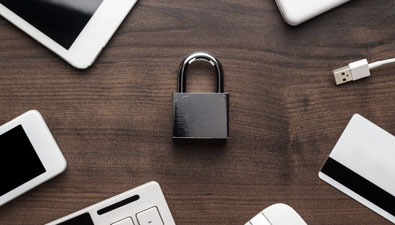Tips to Keep Your Information Safe
April 3, 2017

Protect Your Information When Banking Online
It’s wonderful that today we are more connected than ever, able to access so many resources at home on our laptops or on the go with our smartphones. Being able to check balances, make payments and transfers, and so much more has increased our productivity and peace of mind. But along with the ability to access information from nearly anywhere also comes new challenges.
We’ve all become savvier and more “digital” in the ways we work, but unfortunately so have thieves. The risks of identity theft have grown along with the internet and mobile technology. In fact, according to the U.S. Bureau of Justice Statistics, about 17.6 million people were victims of identity theft in 2014. Around 9 percent of these took longer than a month to get their accounts and lives back on track. Scary!
So how can you keep your information safe even while keeping all the benefits that come with online banking? Thankfully, it’s not that difficult to become more secure. By following some basic guidelines as you work and play online, we’ve collected some tips to help you keep your financial information protected:
Use Secure Passwords. Secure passwords are the front lines of defense for any site, and are that much more important when it comes to online banking or other sites that contain personal information.
So, what makes a password more secure?
- Avoid using any part of your name, family members’ names, addresses, phone numbers, common dictionary words, or other easy-to- locate information.
- Use a longer password. Think in terms of phrases, not just words. Security expert Bruce Schneier recommends creating a password of 12 characters or longer. There are online tools out there to help you create a more secure password.
- Use a password manager to keep track of all your passwords, such as LastPass.
Watch Out for Unsecured Networks. Avoid online banking on your laptop at coffee shops and other public places. While your home network is probably encrypted, most public networks are not, meaning others could be watching what you do. If security is a concern for you, make your own network by connecting through your smartphone’s “personal hotspot” or “tethering” features.
It’s also important to watch what you do on computers that aren’t yours – say, a PC at your local library for example. You may want to wait until you can connect more securely at home before accessing any financial or private information. At the very least, make sure to fully log out and close any web browsers you use on public computers.
Ignore Any Messages That Seem Suspicious. A common tactic of identity thieves is to use “phishing” techniques through emails that pretend to be from a service you know, like a financial institution, online store or social network, to entice you to click through and give away your passwords or other personal information. Look closely at requests you receive in your email inbox, and if anything looks out of the ordinary, don’t respond. Better yet, report the email as a phishing attack. Many common email services like Gmail and Outlook.com offer ways to quickly flag suspicious emails.
Keep Up with Updates. Whatever devices you use, from desktop computers to laptops, tablets and smartphones, make sure to update your operating system and web browser software regularly. Most vendors try their best to keep up with the latest security threats and issue software patches to address them. Set your devices to automatically update, or check them periodically.
Stay Aware of Changes to Your Credit. Even with vigilance, identity theft may happen, and you may not realize it until it’s too late. That’s why it’s critical to stay on top of any shifts in your credit score. Using free services like Credit Karma, you can get reports on any new credit inquiries and receive periodic alerts when anything changes.
We’re Here to Help. At Unison, we’ve developed two handy guides with tips for safeguarding your personal information with online banking and avoiding identity theft.

